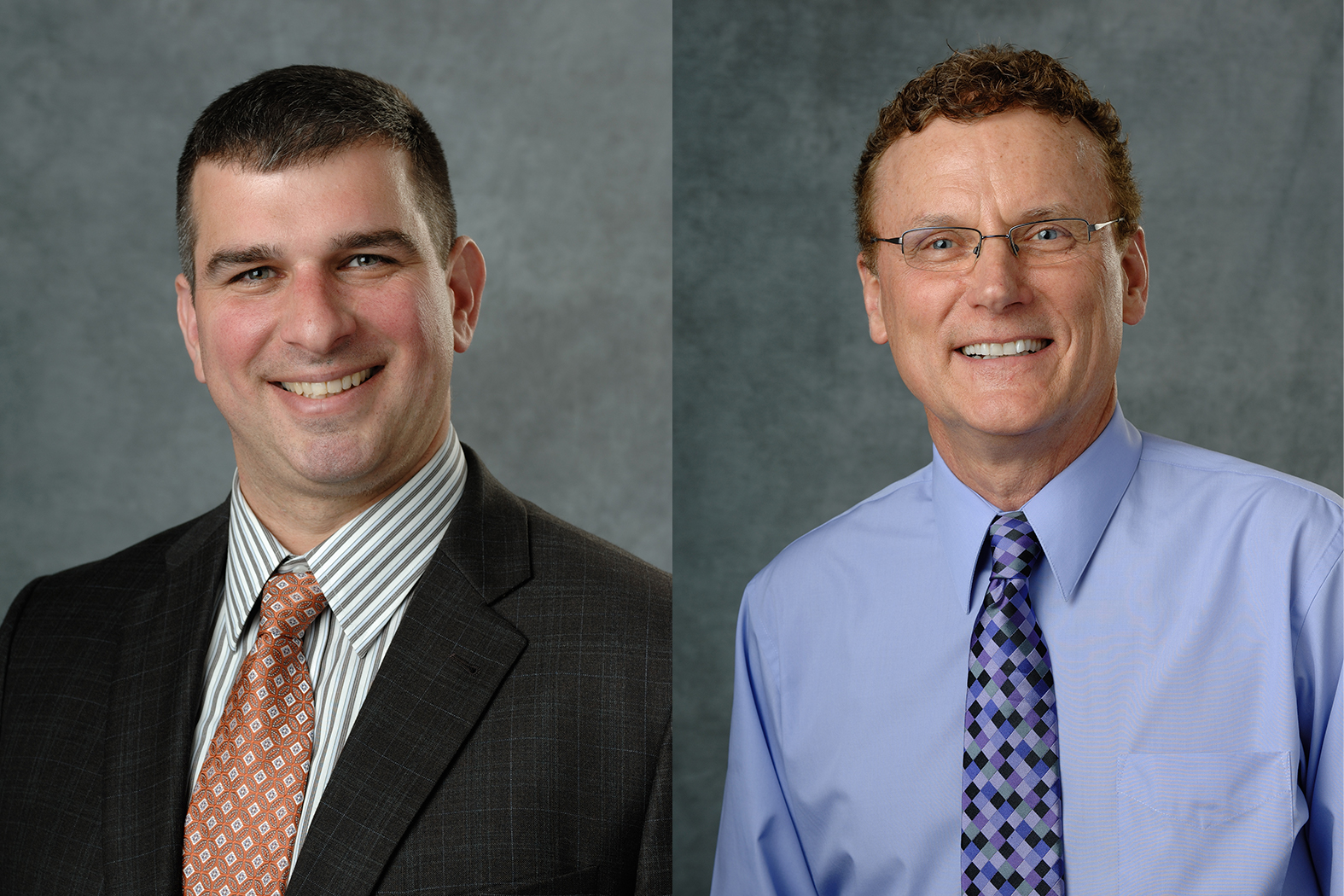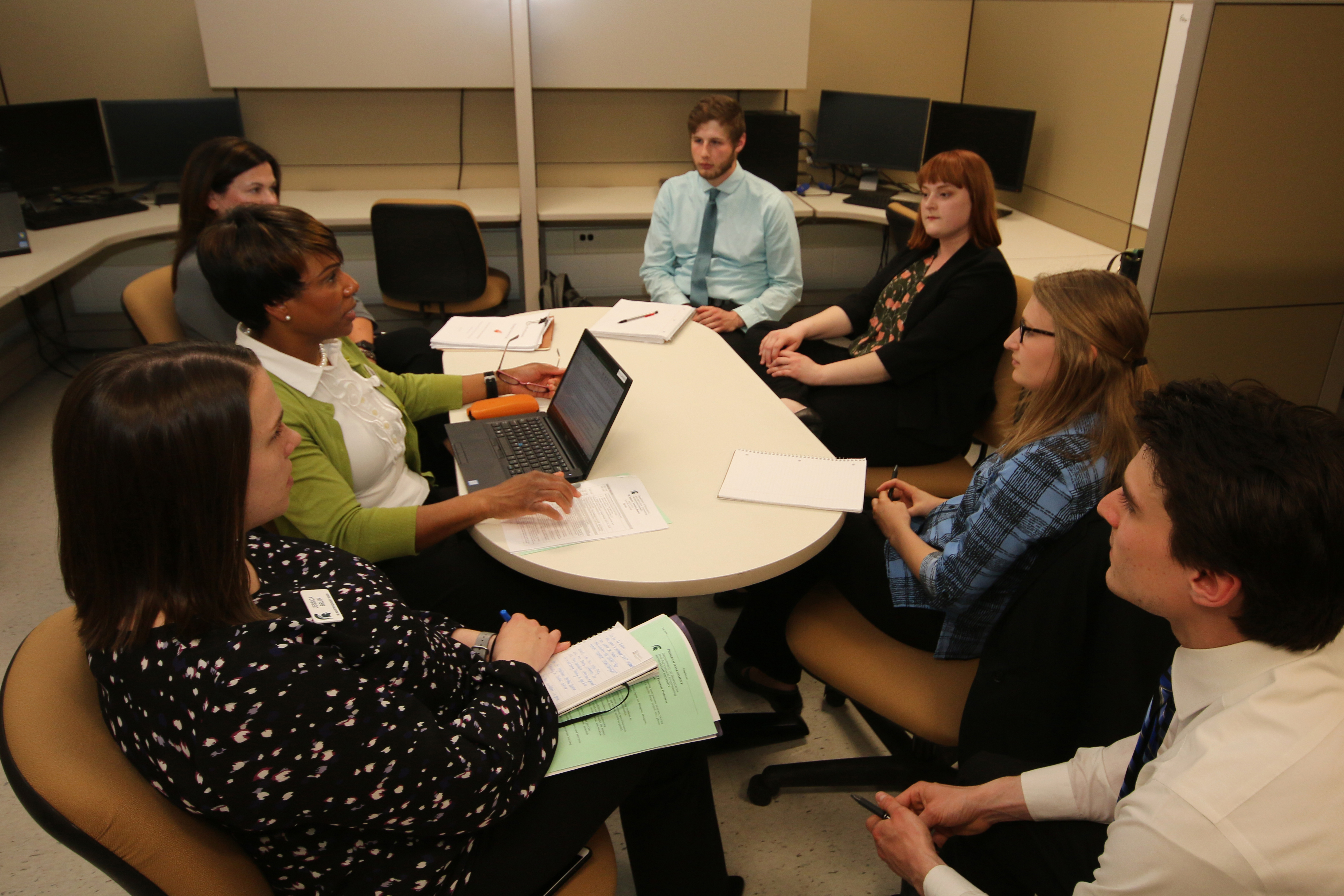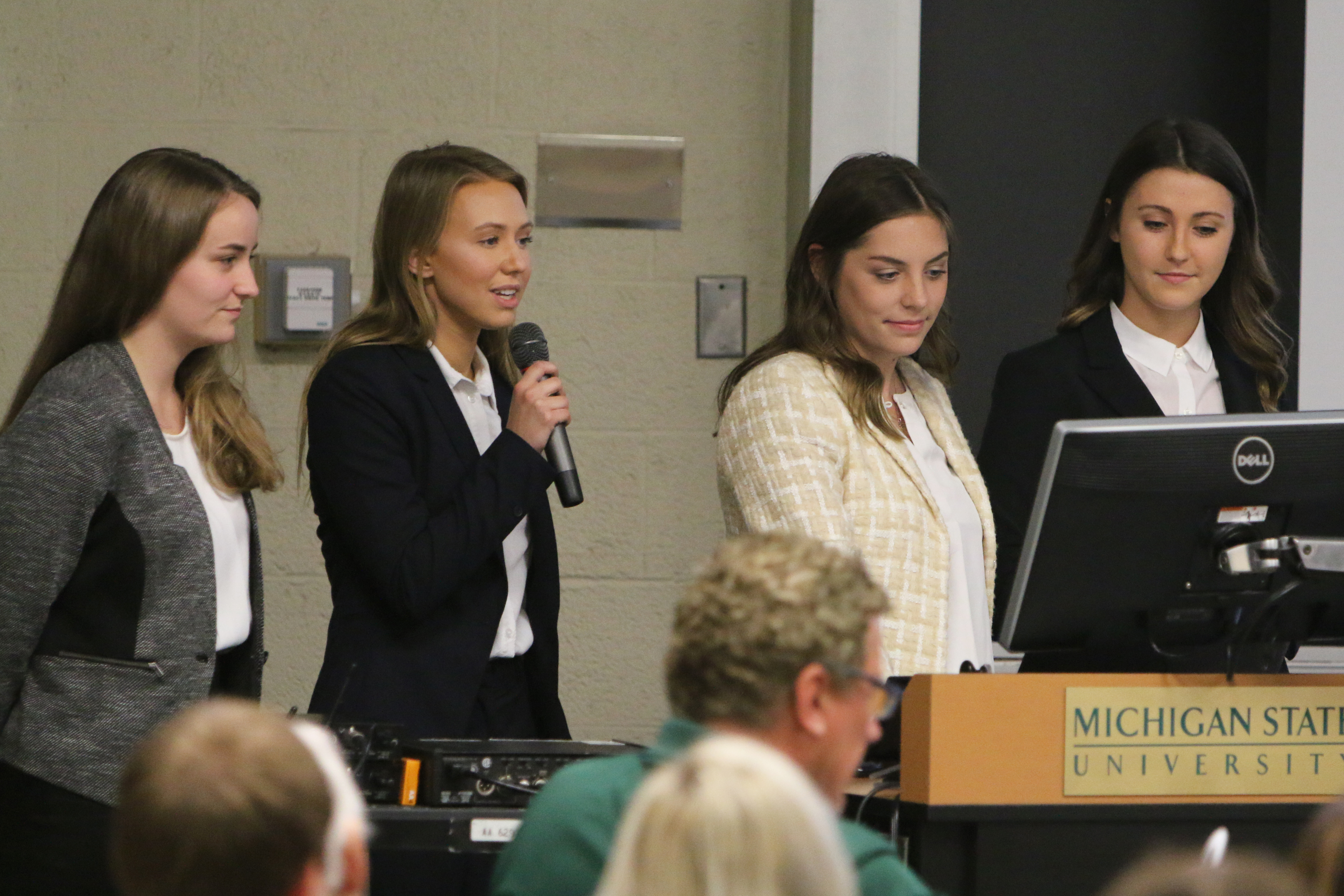Senior Design experience prepares MSU biosystems engineers for careers after graduation
Michigan State University's biosystems engineering program collaborates with industry partners to provide real-world opportunities for students.

By the time students in the Michigan State University (MSU) Department of Biosystems and Agricultural Engineering (BAE) reach their senior year, they will have accumulated an array of knowledge and skills about how their work can be used to improve quality of life in the fields of food, energy, environment and health.
Senior Design — a two-semester experience that takes place over the course of an entire academic year — helps prepare biosystems engineering students for life after graduation. It consists of two required classes: “Biosystems Design Techniques” (BE 485) in the fall, and “Biosystems Design Project” (BE 487) in the spring.
“In Senior Design, students work with industry sponsors and clients to deliver an engineering design that solves a real-world problem,” said Bradley Marks, BAE chair. “This is something way more than a homework assignment or a final class project. It's the most significant pre-professional engineering experience in our curriculum.”

In addition to designing projects, Senior Design students learn the fundamentals of workplace communication and engineering standards.
“It’s an opportunity for students to bring together the theoretical classroom learning that they have compiled over their first three or four years at MSU, and start using those skills and that knowledge to solve and address the real-world engineering projects — problems that are more open-ended and don't have clean, uniform answers,” said Dana Kirk, BAE associate professor and Senior Design co-instructor.
"It also is a chance for us to build some more professional skills in the students, such as technical writing, oral communications, teamwork, time management, and also an understanding and appreciation of engineering standards in safety and project management, and how they influence the work of an engineer.”
Kirk has been teaching Senior Design with Luke Reese, BAE associate professor, since 2013.
“[Reese] comes in with a technical systems management background. He's also very good with the communications and professional development aspects of the course,” Kirk said. “I'm a Licensed Professional Engineer, so I'm more focused on the project management and the technical aspects of the design. We bring different skills and perspectives to the students.”
Defining and solving real-world problems
Prior to the beginning of each academic year, Kirk and Reese reach out to career advisors in the colleges of Agriculture and Natural Resources, and Engineering, industry partners and alumni for project ideas.
When BE 485 begins in the fall semester, students are given a brief of each project, and choose the top three they want to work on based on the briefs. These selections are taken into consideration when students are assigned to project teams of three to five members. Each team has an MSU faculty advisor with expertise in the project area, and a contact at the company they are working with that who can offer guidance and support.
Alicia Ziegler graduated from MSU’s biosystems engineering program in 2021 and took Senior Design in the 2019-20 academic year. Her senior design project involved assessing the distribution of inclusions in ice cream, such as cookie dough balls and chocolate chunks, for Oregon-based Tillamook Creamery. She said the experience helped prepare her for a career as a food processing engineer with Cargill.
“Coming up with effective solutions to unexpected problems was the biggest part,” she said. “But also, really understanding what the problem you’re trying to solve is.
“You kind of have to dig deeper. Once you get your true question, that's really when your work can get started, and that's the one that you really tackle. If you can figure that one out and solve that, then all those other questions you had leading up to that really fall into place.”
Cassaundra Edwards is a MSU biosystems engineering alumna who is currently a senior supply quality engineer at Tillamook. She was the sponsor for Ziegler’s group’s project, one of approximately 10 Senior Design projects she’s sponsored through various employers.
“I'm kind of the conduit between the student group and the company in terms of the work that needs to be done to solve the problem,” Edwards said. “The students are giving updates to me and to key stakeholders. We make sure that they're moving in the right directions and meeting their milestones, whether it's the milestones that the professors have set for them in terms of the actual course, but also meeting the milestones of the company that they're solving this problem for.”
Industry Advisory Board and Showcase: Designing relevant curriculum and communications
Edwards has also been a member of the BAE Industry Advisory Board — a group of industry representatives and alumni that ensures the department’s curriculum is staying relevant to trends in the biosystems engineering field — for over a decade.
“The Industry Advisory Board’s job is to make sure that BAE’s academic program is staying current with the way the industry is evolving, and students are coming out of the program completely prepared for the kind of position of the industry and where it's moving,” she said.
Many Industry Advisory Board members serve as sponsors for projects and support students through Senior Design. This includes Showcase, the year-end culmination event, for Senior Design and the department as a whole.

During Showcase, Senior Design students meet with industry representatives to discuss technical aspects of their project. These meetings typically consist of two to three industry representatives to a team.
“We ask them questions challenging them on their thinking and seeing how they can answer questions quick on their feet — just really preparing them for what they'll have to do in a real professional situation where you are making a proposal to key stakeholders in an organization to convince them to move forward with project recommendations that you're making,” Edwards said.
Following presentations to the industry representatives, students give a high-level, less technical presentation to an audience that includes family, friends and BAE faculty and staff.
“When you go to a client, and you have to give your design presentation, it's often not to other engineers. The presentation is to the business leader, or the manager, or the vice president, so the decision makers, or the city council — whoever your client is,” Marks said. “We’re showing students how to explain their design process in high-level, less technical terms. That's been important in the evolution of understanding the students customizing their communications.”
Lindsey Moran, a 2021 BE graduate, worked with Consumer’s Energy to design a renewable natural gas system that could be implemented in MSU’S South Campus Anaerobic Digester for her Senior Design project during the 2020-21 academic year.
She said the professional communications skills she learned from the project have helped her excel in her current role as a quality engineer intern at SeaSpine, a medical technology solutions company based in San Diego.
“In addition to gaining knowledge about renewable energy solutions, I also learned about the value of teamwork, time management and clear communication,” Moran said. “It became apparent how important it is to be organized and on top of things.”
Adapting and adjusting during the pandemic and beyond
Senior Design experiences in the 2019-20 and 2020-21 academic year were accompanied by unique challenges due to the novel coronavirus pandemic. Most of the design work in 2019-20 was completed in person, but Showcase pivoted to a virtual format. In 2020-21, the entire class and Showcase were done virtually.
Joe Riordan, 2021 BE graduate, said one of his biggest takeaways from his Senior Design project — creating a wastewater solution for Abbott Nutrition in Sturgis, Mich. — was managing a team under difficult circumstances.
“Our whole project was done during COVID-19. I never met any of my teammates face-to-face. I never met any of the clients face-to-face, except on Zoom. We never went to the facility,” said Riordan, who now works as a technical solutions engineer for Epic, a medical software company based in Madison, Wis. “There were a lot of things that we didn't have access to that we would've in a normal year, but we still had to do the project and produce a meaningful design report at the end.”
While BAE is looking forward to Senior Design and Showcase becoming a primarily in-person experience again, Marks said the Industry Advisory Board has stressed the importance of students understanding how to function in remote and hybrid environments as they transition to the professional world.
“The pandemic has been challenging, but it wouldn’t be smart to just throw out some of what we’ve learned and say, 'ok, go back to the old model of Showcase and Senior Design,’” he said. “Then, we would be losing the opportunity for the students to use these remote work skills that can make them stand out.”
Marks also said a hybrid Senior Design experience could offer flexibility for students doing a co-op or internship experience, as they could participate in the class remotely. However, he, along with Edwards, Reese and Kirk recognize that in-person interaction is valuable for Senior Design and Showcase.
“There is something about human connection that just makes those interactions much more powerful versus doing it through a computer,” Edwards said. “Of course, technology is important. It has allowed us to still connect during the pandemic, but you'll hear a lot of people in the industry, and of course at the university, talk about just having that personal connection and that being much more effective than a Zoom call, in certain settings.”
Preparing students for successful careers
Edwards said the biosystems engineering curriculum, especially Senior Design, has successfully integrated technical engineering elements with elements of business and relationship-building.

“I think BAE has understood very early the importance of taking a holistic approach,” she said. “The engineering discipline isn't just about engineering. It's about people. It's about more than just yourself. It's about ‘how do you interact in a company where there are different functions and you're a part of a team and what does that look like?’ It's preparing students for all of those things that will be their life when they step off MSU's campus.”
Kirk and Reese both said they’ll receive feedback from recent alumni about how valuable Senior Design proved to be in their careers.
“The important thing for me is when we get feedback from former students two, three, four years down the road, it's almost always positive,” Kirk said. “The experiences they had, that they are actually able to use those in their professional careers, whether it's how they edit a report, how they give a presentation, how they manage clients when project scopes are creeping.”
“The most rewarding part of my job is really seeing young people thrive and doing good things,” Reese said.
Marks said Senior Design and Showcase are pride points for BAE and its faculty, students and alumni.
“These experiences demonstrate that our graduates leave BAE ready to excel in their professional careers,” he said. “We’ve also had numerous repeat sponsors. If a company comes back next year and sponsors a project again, and the year after that, and the year after that, it's a validation that our graduates are meeting a market need.”
Edwards agreed.
“BAE has done a good job of preparing students for the transition to the real world,” she said. “Senior Design is a comprehensive experience that different engineering programs are working up to, but MSU biosystems engineering is already there.”



 Print
Print Email
Email



